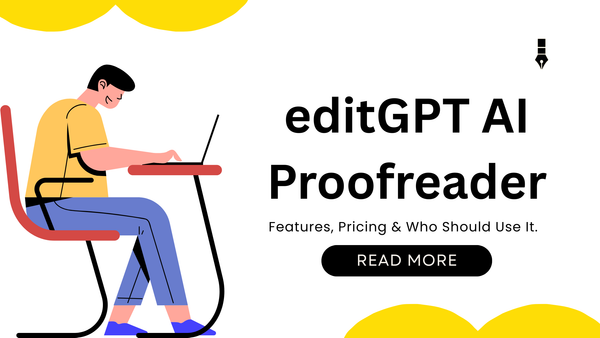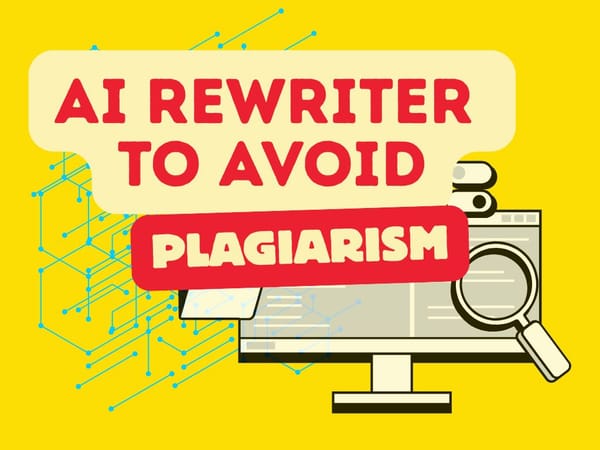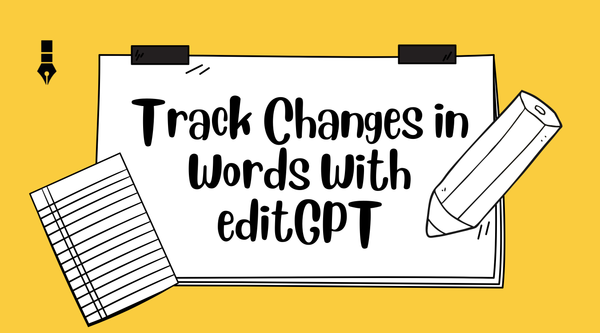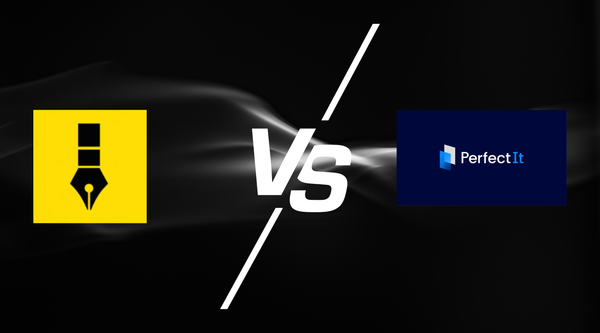editGPT Extension vs Web App: Best Choice for Serious Editing
Not sure whether to stick with the editGPT extension or upgrade to the web app? Here’s a breakdown of which one makes sense for quick fixes and which is best for serious editing.
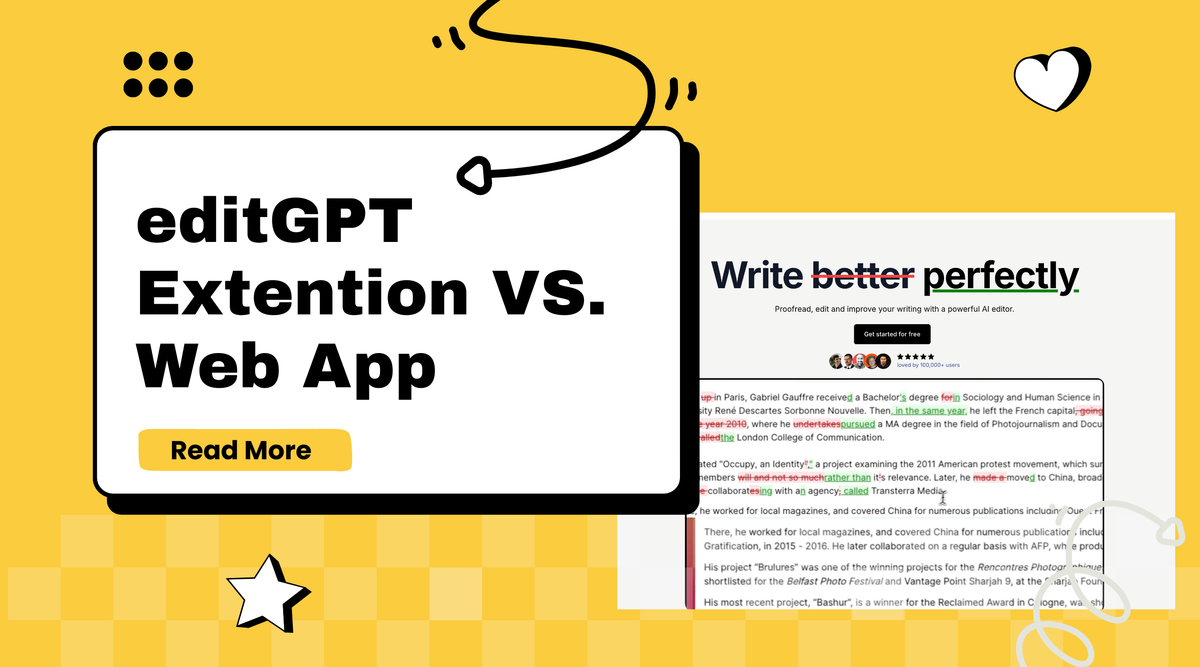
Search “best AI proofreader” today and you’ll see dozens of tools promising flawless grammar checks. But when you’re actually sitting with a Word doc full of tracked edits or a client report where formatting matters, a bigger question pops up: Which version of editGPT should I use, the Chrome extension or the full web app?
We both know grammar fixes alone won’t cut it if you’re working in academic, professional, or collaborative settings. Your editor needs to respect workflows, maintain compliance, and preserve every tracked change so no context gets lost. That’s where choosing between editGPT’s extension and its full web app becomes critical.
The extension is lightweight and convenient. It is built for quick checks, spotting typos in chatgpt. The web app, on the other hand, is designed for more serious editing tasks where formatting, tracked edits, and compliance really matter.
In this blog, we’ll unpack what each option does best, who they’re built for, and how to choose the one that actually fits your editing needs.
Why People Search For The “Best AI Proofreader”
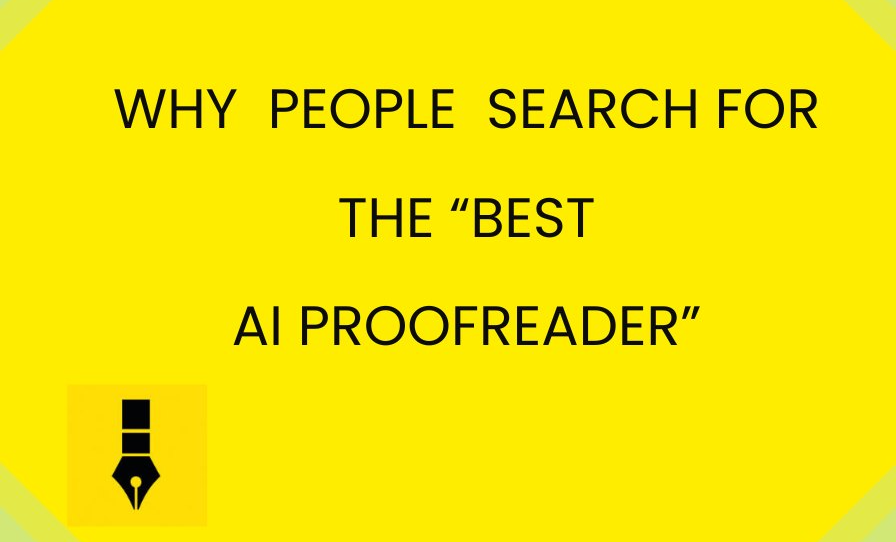
When people look for the best AI proofreader, it’s rarely about grammar alone. They need accuracy, clarity, and tone that stay true to their intent.
Workflow also matters. Copying text in and out of apps or losing formatting slows everything down. The right tool should integrate smoothly, keeping edits where they belong.
And in high-stakes settings like academic work, legal documents, or agency deliverables, every tracked change counts. A missed edit or broken format isn’t just inconvenient, it’s costly.
That’s why editGPT offers two paths: a browser extension for quick polish and a full web app for serious, compliance-ready editing.
What The editGPT Extension Offers
The editGPT extension integrates with your browser and plugs into the ChatGPT interface so you can edit text where you already work.
It adds features for tracked edits: after you submit text, an editGPT panel lets you accept or reject changes, see markup, and copy the edited result.
You still need to prompt the tool with instructions like “Proofread this” or “Rewrite this,” which means some text highlighting or copy and paste is involved. It’s faster than manual editing, but not entirely seamless.
The extension is best for lighter edits where you want clarity, correctness, and tone polish without switching tools or uploading documents. It’s ideal for improving responses inside ChatGPT, refining quick drafts, or catching small errors. However, it’s not built for preserving full document formatting or handling compliance-heavy editing.
What The editGPT Web App Offers
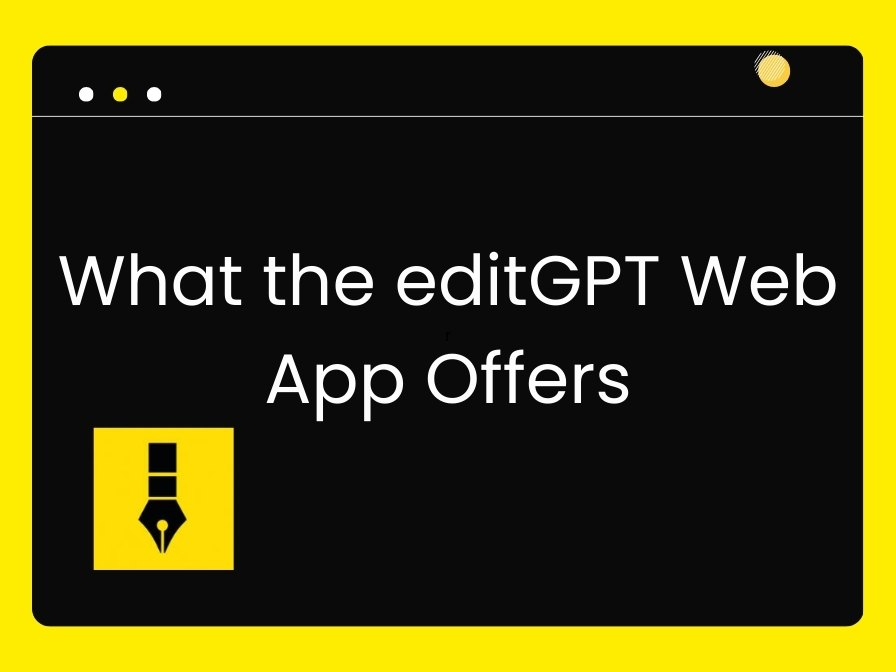
The editGPT Web App is built for professionals who need more than surface-level proofreading. It isn’t just another text editor, it’s a complete workspace that merges AI-powered editing with the accountability of traditional workflows.
Key Advantages Include:
- Import/export with Track Changes intact: every insertion, deletion, or rephrase is logged so collaboration stays transparent.
- Retention of comments, formatting, and citations: critical for structured documents where layout and references matter.
- Professional-grade features: including deeper accuracy in suggestions, document history for safe rollbacks, and consistency checks to keep tone and terminology uniform across long projects.
Who Benefits Most From editGPT?
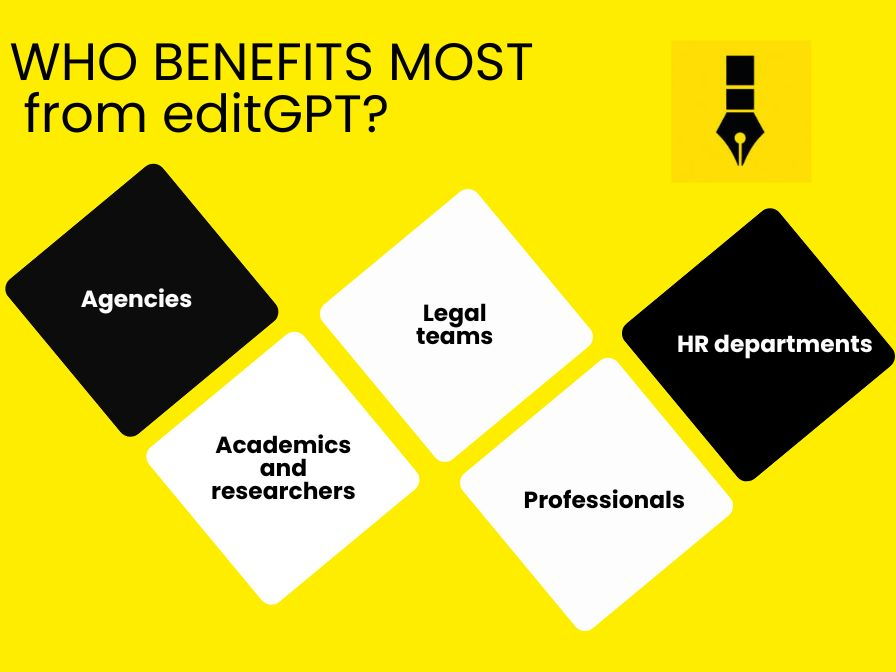
- Agencies managing multiple client deliverables where consistency is key.
- Legal teams that must preserve citations and formatting in sensitive documents.
- HR departments drafting policies that require absolute clarity and uniformity.
- Academics and researchers who cannot risk losing citations or structured references.
- Professionals preparing proposals, reports, and formal content that demand precision.
In practice, this means:
- A lawyer can safely edit briefs without losing citations.
- A researcher maintains accurate references while improving readability.
- An HR manager creates clear, consistent policies without repetitive manual reviews.
In short, the editGPT Web App combines AI efficiency with the rigor required in professional settings. You don’t just get smarter edits, you get a tool that respects how documents are created, reviewed, and finalized in the real world.
editGPT Extension vs editGPT Web App
Straight Verdict
- Choose the editGPT Web App if you need serious document handling with Track Changes, comments, citations, and professional consistency.
Why the Web App Is the “Best AI Proofreader”
Grammarly, Quillbot, all these popular tools, they’re handy if you just need a quick grammar check or to smooth out a clunky sentence. I use them too sometimes.
But if you’ve ever worked on something more serious, like a contract, a policy draft, or a paper with a ton of citations, you know those fixes only go so far. That’s where the editGPT Web App really stands out.
It’s built to handle the heavy stuff. You can drop in a document, run edits, and when you export it, all your Track Changes, comments, footnotes, and formatting are still there. No mess, no missing pieces. Basically, it plays nicely with the way professionals already work, which is a big deal for law, HR, agencies, or academia.
Unlike Grammarly or Quillbot, the editGPT Web App is not limited to polishing text in isolation. It was designed with real professional workflows in mind. With import and export that preserves Track Changes, comments, formatting, and citations, you get a tool that fits directly into established processes used in law firms, HR departments, agencies, and academia.
Compliance and accountability are another key difference. Grammarly shows you a corrected version, but it doesn’t give you the transparent history of what was changed. Quillbot can paraphrase quickly, but it risks distorting citations or breaking references.
In contrast, the editGPT Web App provides document history and consistency checks, ensuring you can always trace what happened, maintain version control, and keep tone and terminology aligned across multiple drafts.
That level of rigor matters when the stakes are high. A student may be satisfied with Grammarly’s grammar fixes, but a legal professional cannot risk losing footnotes. An HR manager cannot afford to have policy documents lose structure.
An agency handling multiple deliverables needs the confidence of consistent formatting. For those users, editGPT is not just convenient, it’s essential.
The extension is a strong option for everyday, in-browser editing. But when the question is which tool deserves to be called the “best AI proofreader,” the editGPT Web App is the only answer.
It combines AI efficiency with professional-grade reliability, giving users the one thing competitors can’t: trust that every detail will be preserved.
Use Cases And Testimonials
The editGPT Web App proves its value across different fields because it keeps the details that matter.
Students and professors rely on visible tracked changes. A graduate student shared how editGPT helped her finalize her thesis: “I could see every edit suggested and accept or reject them. My advisor loved that I could show exactly what changed.” For professors, tracked edits mean clearer feedback and smoother revision cycles.
Agencies and clients need formatting and collaboration. A marketing agency used editGPT to polish client reports: “Unlike other tools, it didn’t strip out headings or design. We delivered documents that looked exactly the same but read better. Our clients noticed the difference.” Consistent formatting and preserved comments save teams hours of back-and-forth.
Legal and HR teams work under strict compliance requirements. One HR manager explained: “Policy updates must show who changed what and why. With editGPT, we could keep citations, formatting, and a transparent edit trail. It made our compliance reviews faster and less stressful.” For law firms, retaining citations while tightening language ensures that every document stays reliable.
Across these use cases, editGPT delivers professional accuracy without breaking established workflows. Whether it is a thesis, a client presentation, or a legal policy, users trust editGPT because it preserves what matters most, structure, transparency, and collaboration.
Pricing And Getting Started
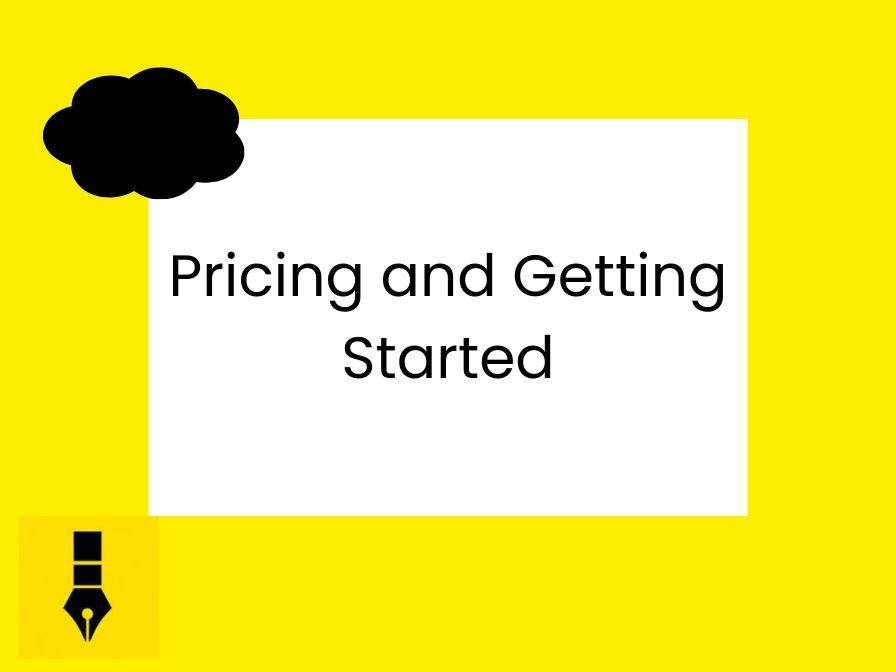
editGPT is designed to be more affordable than tools like Grammarly Premium while still offering professional-grade proofreading. The web app uses a subscription model with tiered plans, making it accessible whether you’re a student polishing essays or a professional handling client work.
Compared to Grammarly’s higher monthly rates, editGPT positions itself as the budget-friendly option without cutting back on advanced features like tracked edits and formatting preservation.
There’s also a free trial available so you can test it before committing. The trial gives you enough words to see how editGPT handles your documents and whether it fits your workflow.
Getting Started Is Simple:
- Create your account on the editGPT Web App.
- Upload your first document or paste in text.
- Review edits with visible track changes, comments, and preserved formatting.
- Export your polished file, ready to share.
In just minutes, you can move from raw draft to professional output without losing the details that matter.
If you’ve been searching for a professional-level proofreader that’s affordable and easy to use, editGPT delivers. Start your free trial today and see the difference in your editing workflow.
Frequently Asked Questions About editGPT Ai Proofreader

Is The Extension Enough For Me?
If you only need quick edits for emails, essays, or casual writing. The extension is lightweight and convenient.
Can I Use Both The Extension And The Web App?
Absolutely. Many users combine them, extension for everyday polish, web app for larger projects that require tracked edits and formatting.
Does editGPT Break Rormatting?
The web app is built to preserve formatting when you upload documents. The extension works directly in ChatGPT, so formatting depends on that platform.
How Safe Is It For Academic Or Citation-Heavy Work?
editGPT is context-aware, which makes it suitable for papers and research. It respects citations and references without rewriting them.
Is It Better Than Grammarly Or Quillbot?
For grammar-only fixes, the tools are similar. Where editGPT stands out is in tracked edits, formatting preservation, and compliance, features Grammarly and Quillbot don’t fully deliver.
Conclusion
The choice comes down to your needs. The extension is perfect for lightweight, everyday editing when speed matters. But the web app is the real best AI proofreader for serious editing, where tracked changes, formatting, and compliance can’t be compromised.
Don’t settle for casual fixes. Upgrade to the editGPT Web App today and experience editing that fits the way you actually work.
Recommended Reading
- Video review: This AI Text Editing Tool Is FLAWLESS!
- Best AI Proofreader Tools of 2025 (Tested for Accuracy, Speed & Tone)
- editGPT vs Grammarly vs Quillbot: Which Writing Tool is Best?
- The Best AI Proofreaders That Actually Work (Free & Paid)
- Try editGPT
- Review: Wordtune Editor vs editGPT
- Review: Grammarly vs editGPT
- Review: ProWritingAid vs editGPT
- Review: Hemingway Editor vs editGPT
- Review: 10 Best Grammarly Alternatives for Writers in 2025/2026
- Review: editGPT vs Trinka AI: Which is the best Grammarly alternative?
- Best AI Tools for College Essay Editing in 2025
- What is the best AI Proofreader?
- Best AI Proofreader Tools of 2025 (Tested for Accuracy, Speed & Tone)
